The recent news
Feb. 21, 2025
Events : JoRC
► Référence complète : Journal of Regulation & Compliance (JoRC) and Institut de Recherche Juridique de la Sorbonne (André Tunc - IRJS), Durabilité de l’Internet : le rôle des opérateurs du système des noms de domaine. Compliance et Régulation de l’espace numérique (Sustainability of the Internet: the role of the operators of the domain name system. Compliance and regulation of the digital space), Paris 1 Panthéon Sorbonne University, 21 February 2025
____
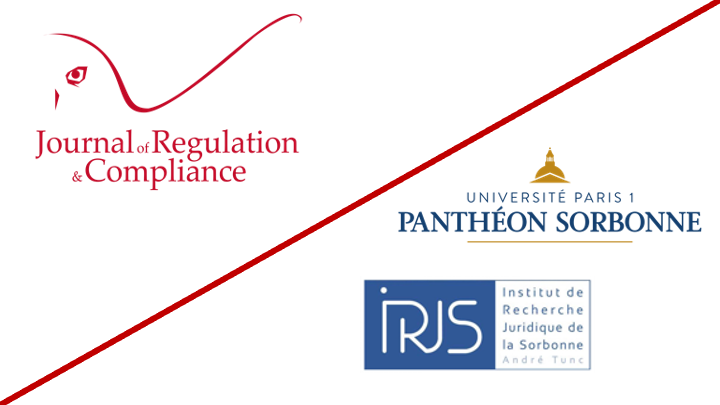
____
► The symposium is organised by the Journal of Regulation & Compliance (JoRC) and the Institut de Recherche Juridique de la Sorbonne (André Tunc - IRJS) of Paris 1 Panthéon-Sorbonne University.
The symposium is held under the scientif supervision of 🕴️Marie-Anne Frison-Roche and 🕴️Grégoire Loiseau.
____
► Presentation ot the theme: The digital space has been built on and as a system. Its primary interest is of a negative nature: it consists of to be preserved against the prospect of systemic failure, of not collapsing. Like all other systems, this 'Monumental Goal' specific to the digital system justifies resources that incorporate this concern for the future. As with all systems, it integrates and relies on the specific technical nature of this system.
The digital space is largely based on the invention, technology and architecture of domain names. Domain names, as an addressing system, enable users to enter the digital space and find other Internet users. The uniqueness and solidity of the domain name system, entrusted to a single root and decentralisation, makes this community possible for those who use the digital space and ensures the technical durability required, without which the digital space would be compromised.
The architecture, operation, operators and what they do under the control of legislators, regulators, judges and legal subjects are therefore examined from a dual technical and legal perspective, in the light of the imperative of sustainability.
This allows to progress in 4 stages.
Firstly, to examine the permanence in time and space of the domain name system, insofar as it is the foundation of the Internet and the digital system. This technical construction gives rise to legal qualifications, not only for the present but also for the future, since the Web3 offers new technical solutions.
Secondly, this technical sustainability is an imperative that is built into the operators of the domain names themselves, which are inter-linked not only at national level but also at global level, this cross-linking being necessary for the security of the system. The State is present through public law techniques that enable surveillance, control and possible recovery.
Thirdly, it imposes constraints on the operators subject to them in order to serve this monumental goal of technical sustainability, and these constraints themselves generate as many powers as they need to usefully achieve this mission. This proportionality must be at the heart of the method and the requirements. The relationship between constraints and powers also stems from it.
Fourthly, this imperative of technical sustainability, which is global in nature, gives way to imperatives of societal sustainability, more localised in space and time, when domain name operators are called upon by the legitimate authors of binding standards, legislators in the first instance, to express concerns such as the protection of people involved in the digital space and whose rights are compromised or who are in danger.
This second type of sustainability, which is more localised and less inherent in the architecture of the Internet, is justified by the available power of the operators concerned and their adherence to social imperatives. The resulting constraints and powers are therefore not the same.
The 2 sustainabilities must then be articulated in a conception that is both teleological and pragmatic.
____
To register for a physical presence: Cliquer HERE
To register for an online presence: Cliquer HERE
🧮The event will take place at the Paris 1 Panthéon-Sorbonne University, 12 place du Panthéon 75005, in Room 6, on 21 February 2025.
____
► Speakers:
🎤Pierre Bonis, Chief Executive Officer of the Association française pour le nommage Internet en coopération (Afnic)
🎤Lucien Castex, Adviser of the Afnic Chief Executive Officer for Research internet and society and Internet governance
🎤Marie-Anne Frison-Roche, Full Professor of Regulatory and Compliance Law, Director of the Journal of Regulation & Compliance (JoRC)
🎤Claire Leveneur, Senior Lecturer at Paris-Est Créteil University
🎤Grégoire Loiseau, Full Professor at Paris 1 Panthéon-Sorbonne University
🎤Samir Merabet, Full Professor at the University of West Indies
🎤Antoine Oumedjkane, Senior Lecturer at Lille University
🎤Frédéric Sardain, attorney at law, Jeantet law firm
____
🔻Read a detailed presentation of the event below:
Dec. 5, 2023
Events : JoRC
► Full Reference: Journal of Regulation & Compliance (JoRC) and Institut de Recherche Juridique de la Sorbonne (André Tunc - IRJS) of Paris 1 Panthéon-Sorbonne University, La Vigilance, pointe avancée de l'Obligation de Compliance (Vigilance, advanced point of the Compliance Obligation), Paris 1 Panthéon-Sorbonne University, December 5, 2023, 12 place du Panthéon, salle 6.
____
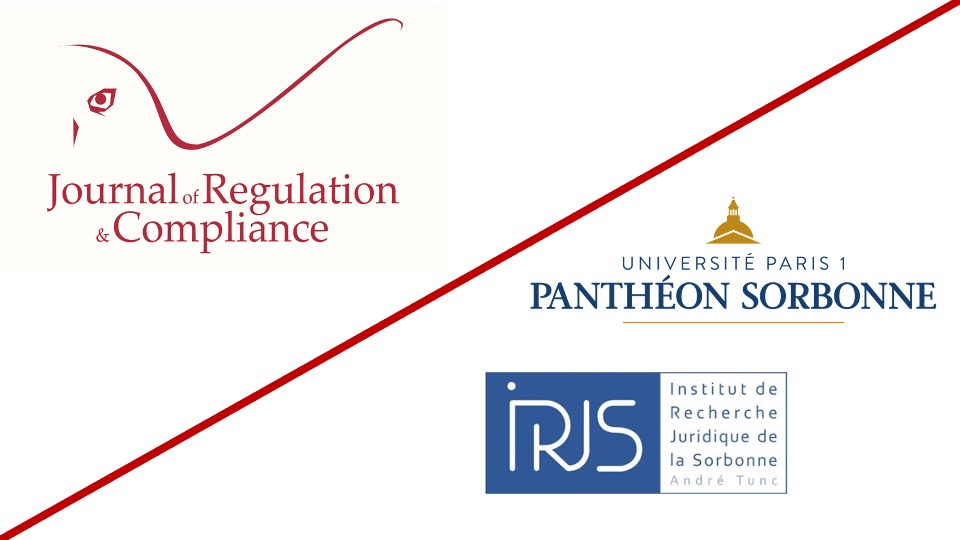
____
🏗️ This symposium takes place in the cycle of symposiums organised by the Journal of Regulation & Compliance (JoRC) and its partner Universities, focusing in 2023 on the general theme of Compliance Obligation.
____
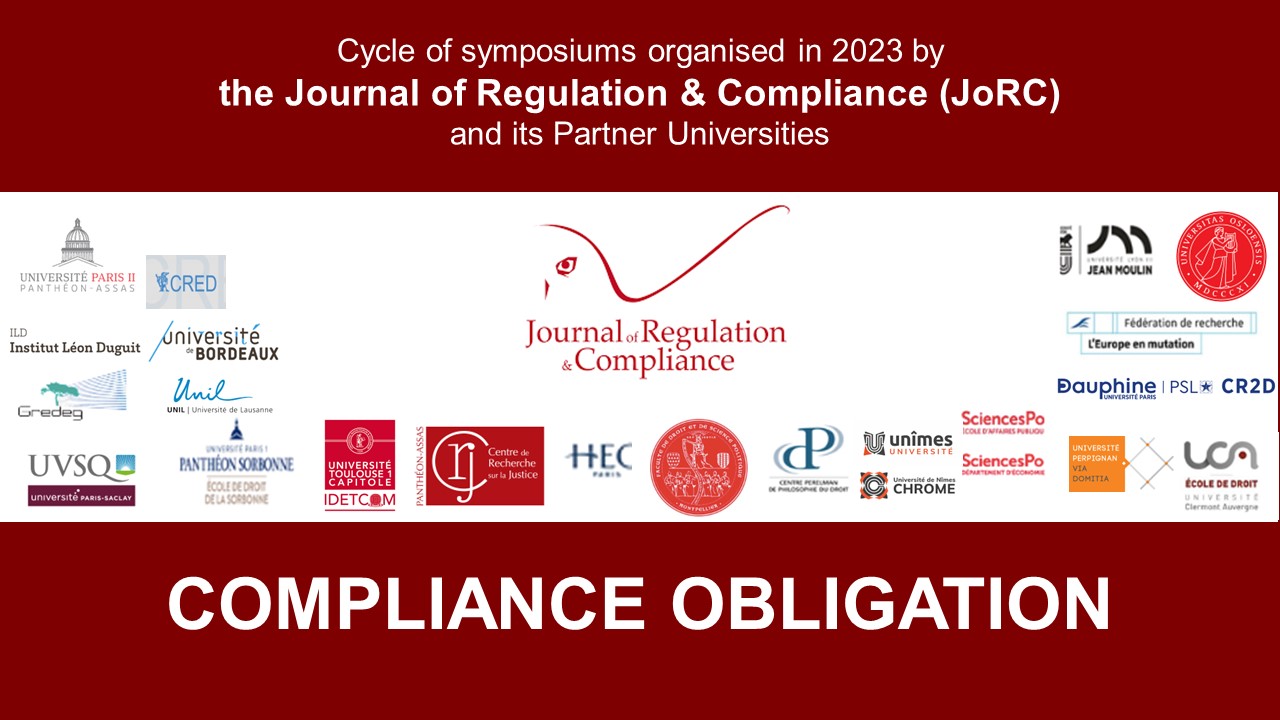
____
► This symposium is organised by the Journal of Regulation & Compliance (JoRC) and Paris 1 Panthéon-Sorbonne University, through its Institut de Recherche Juridique de la Sorbonne (André Tunc - IRJS).
This symposium is held in French.
the symposium is under the scientific direction of 🕴️Marie-Anne Frison-Roche, 🕴️Mustapha Mekki , and 🕴️Jean-Christophe Roda.
____
To register for a physical presence: anouk.leguillou@mafr.fr (as places are limited, you will be asked to confirm 48 hours in advance).
To register for an online presence, via Zoom: Click HERE
🧮 The event will take place at Paris 1 Panthéon-Sorbonne University, 12 place du Panthéon 75005, in Salle 6, on 5 December 2023.
____
► Présentation of the theme : The Vigilance Obligation is difficult to define because of the multiplicity of texts and cases in which it can be understood. This is particularly true of the Vigilance mechanism, which illustrates, and even emphasises, the Vigilance Obligation. Through international texts, French law and European texts that have been adopted or are in the process of being adopted, the constraints of vigilance, but also the structures and actions that companies have put in place and the actions that stakeholders have taken, Vigilance has highlighted aspects of the Compliance Obligation, and even modified it.
The revelatory effect thus produced and the movement thus unleashed, whose roots run deep and whose systemic effects are very significant, justify a greater focus on mechanisms that are interconnected, whereas they are sometimes perceived in silos, which makes it difficult to understand the whole picture. In the same way, because Vigilance is the advanced point of the Compliance Obligation, we can better distinguish and articulate what is sector-specific, in particular in banking and finance or in digital matters, and articulate them with what Vigilance has, like Compliance, of a more general nature. What's more, the intensity of Vigilance varies according to its ambitions and the position of the company subject to it, which is reflected in the variations in legal qualification, ranging from a duty to a criminally sanctioned obligation.
The different legal systems reflect these developments in their legislation, case law and the practice of companies and stakeholders in specific ways, because these different techniques express standards of behaviour and accountability, which are directly reflected in evidential requirements, concepts of responsibility and institutional translations through possible regulatory bodies.
As a result, the symposium is divided into three parts. After a general introduction on the systemic relationships between Vigilance and Compliance, the first part will focus on the variation in Vigilance Intensities, the advanced point of Compliance, the second part will look at the Tensions that Vigilance generates or exacerbates, and the third part will look at the Modalities that Vigilance uses in Compliance systems.
____
The proceedings of this colloquium will form the basis of one chapter in the books:
📕L'obligation de Compliance, in the collection 📚Régulations & Compliance, copublished by the Journal of Regulation & Compliance (JoRC) and Dalloz.
📘Compliance Obligation, in the collection 📚Compliance & Regulation, copublished by the Journal of Regulation & Compliance (JoRC) and Bruylant.
____
Speakers:
🎤Laurence Dubin, Professor at Paris 1 Panthéon-Sorbonne University
🎤Marie-Anne Frison-Roche, Professor of Regulatory & Compliance Law, director of the Journal of Regulation & Compliance (JoRC)
🎤Bernard Haftel, Professor at Paris-Nord University
🎤Marie Lamoureux, Professor at Aix-Marseille University
🎤Grégoire Loiseau, Professor at Paris 1 Panthéon-Sorbonne University
🎤Véronique Magnier, Professor at Paris-Saclay University
🎤Gilles J. Martin, Emeritus Professor at Côte d'Azur University, member of the Groupe de Recherche en Droit, Économie, Gestion (GREDEG) of the CNRS
🎤Mustapha Mekki, Professor at Paris 1 Panthéon-Sorbonne University
🎤Jean-Christophe Roda, Professor at Jean Moulin Lyon 3 University
🎤Anne-Claire Rouaud, Professor at Paris 1 Panthéon-Sorbonne University
____
🔻 read a detailed presentation of the manifestation below 🔻
Nov. 30, 2023
Events : JoRC
► Full Reference: Journal of Regulation & Compliance (JoRC) and Conseil national des Barreaux (CNB), Compliance, vigilance et médiation (Compliance, Vigilance and Mediation), November 30, 2023, Amphithéâtre du Conseil national des barreaux.
____
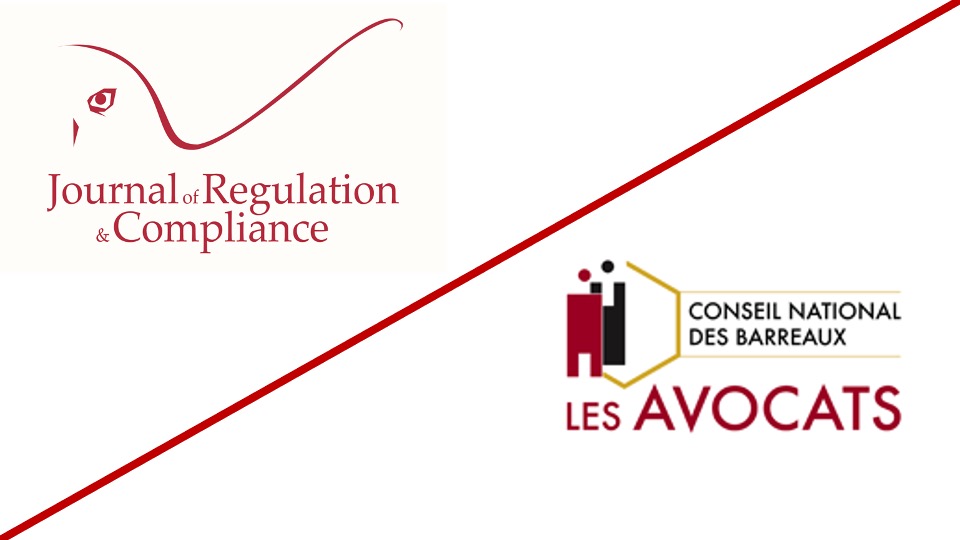
____
► The symposium is organised by the Journal of Regulation & Compliance (JoRC) and the Conseil national des barreaux (CNB).
This symposium is held in French.
The symposium is placed under the scientific direction of 🕴️Matthieu Boissavy, 🕴️Hirbod Dehghani-Azar and 🕴️Marie-Anne Frison-Roche.
____
► Presentation of the theme: To increase respect for human rights and the environment in the context of corporate social responsibility and compliance, public authorities and companies have for several years been implementing instruments and processes for dialogue between companies on the one hand and stakeholders inside and outside the company on the other. Among these, mediation is regularly highlighted as a necessary and fruitful process for reaching agreements that benefit employees and civil society players, as well as the environment and society as a whole.
John Ruggie, Special Representative of the Secretary-General on human rights and transnational corporations and other business enterprises, in his report of 21 March 2011, Guiding Principles on Business and Human Rights, recommends mediation as an effective and appropriate non-judicial grievance mechanism. The ISO 26000 standard on social responsibility also explicitly refers to the use of mediation in the section Actions and related expectations (6.3.2.6) and say that an organisation should establish or ensure the availability of redress mechanisms for its own use and for that of its stakeholders. For these mechanisms to be effective, they should be [...] based on dialogue and mediation: the process should aim to remedy breaches through mutually agreed solutions reached through dialogue between the parties. Where a judgment is desirable, the parties should retain the right to reach it through separate, independent mechanisms.
Similarly, the French law No. 2017-399 of 21 March 2017 relative au devoir de vigilance des sociétés mères et des entreprises donneuses d’ordre (on the duty of vigilance of parent companies and ordering companies) has given rise to disputes relating to the design and application of vigilance plans by certain companies subject to this law. Mediation has been proposed by the courts, sometimes accepted, and we know that some have been successful.
At the same time, the draft European Directive on Corporate Sustainability Due Diligence (CS3D) is likely to impose or extend obligations relating to the duty of vigilance on a large number of companies in the European Union, for the respect of human rights and the environment by companies in global value chains.
The result of all this is that respect for human rights within organisations and companies depends on recourse to the courts, on cooperation processes such as mediation, both project mediation and mediation specific to the resolution of disputes, while recourse to the courts will not suffice to rapidly make respect for these obligations effective.
The legislator and the parties concerned are aware of this, and they refer to the use of mediation as necessary to help both civil society actors committed to respect for human rights and the environment and companies to reach agreements on compliance with these obligations.
Lawyers, mediators and people assisting stakeholders and companies have an important role to play in the success of these mediations.
In collaboration with the Journal of Regulation and Compliance (JoRC), the Conseil national des barreaux (CNB) is organising a half-day conference on "Compliance, vigilance et médiation" ("Compliance, Vigilance and Mediation") to train lawyers to this activity, which will develop either as an extension of another activity or as its own activity, and which has major implications for individual rights, society and the environment.
____
► Construction of the symposium: After a general introduction to the triptych of Compliance, Vigilance and Mediation and the links that it implies, the first part of the event will focus on the contribution of Mediation to the effectiveness of Compliance and, more particularly, to its most advanced aspect, the duty of vigilance. After a debate on this topic, the second part of the event will focus on the conduct of project mediation or dispute resolution in such a context. A conclusion will enable us to draw immediate lessons from the information and exchanges that have taken place.
____
Speakers:
🎤Matthieu Boissavy, attorney at the Paris Bar, vice-president of the Commission Liberté et droits de l'homme of the CNB
🎤Matthieu Brochier, attorney at the Paris Bar
🎤Stéphanie Brunengo, attorney at the Aix-en-Provence Bat, mediator
🎤Malik Chapuis, judge in the 3rd chamber of the Tribunal judiciaire de Paris (Paris First Instance Civil Court)
🎤Bruno Deffains, professor at Paris Panthéon-Assas University
🎤Hirbod Dehghani-Azar, attorney at the Paris Bar, president of the Commission Modes alternatifs de règlements des Règlements (MARD) of the CNB
🎤Marie-Anne Frison-Roche, professor of Regulatory Law and Compliance Law, director of the Journal of Regulation & Compliance (JoRC)
🎤Jérôme Gavaudan, president of the CNB
🎤Thibault Goujon-Bethan, professor at Jean Moulin Lyon 3 University
🎤Céline Haye Kioussis, legal director if the BPCE Group
🎤Stéphane de Navacelle, attorney at the Paris Bar
🎤Lori Roussey, Data Protection Officer, founder and Director of Data Rights
🎤Stephanie Smatt Pinelli, litigation legal director, Orano Group
____
🔻 Read a detailed presentation of the event below:
June 14, 2023
Events : JoRC
► Full Reference: Journal of Regulation & Compliance (JoRC), Centre de recherche sur la justice et le règlement des conflits (CRJ) and Centre de recherche en économie (CRED) of University Paris Panthéon-Assas (Paris II), Compliance: Obligation, devoir, pouvoir, culture, ("Compliance: obligation, duty, power, culture"), Salle des Conseils, University Panthéon-Assas, Place du Panthéon, 12, Paris, June 13 & 14, 2023.
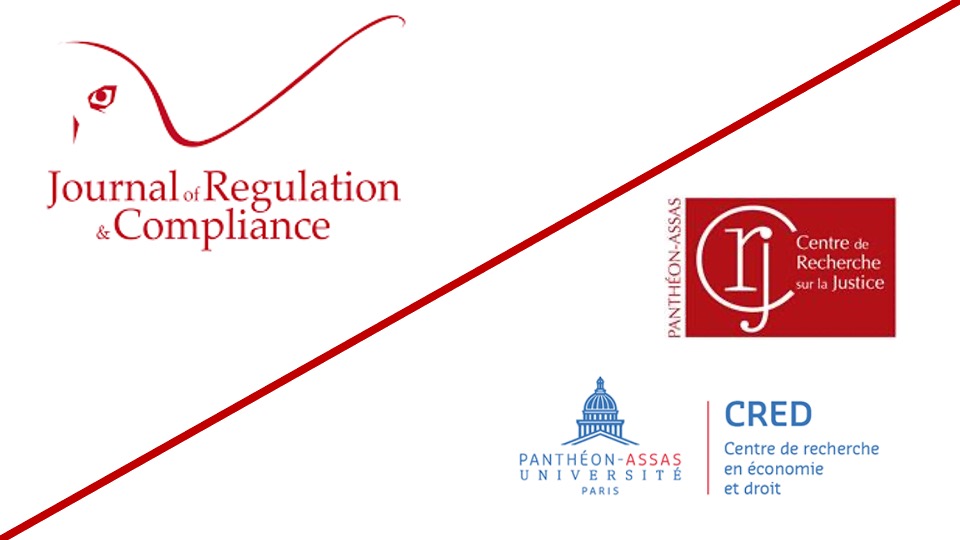
____
🏗️ This symposium takes place in the cycle of symposiums organised by the Journal of Regulation & Compliance (JoRC) and its partner Universities, focusing in 2023 on the general theme of Compliance Obligation.

► This symposium is organised by the Journal of Regulation & Compliance (JoRC) and the University of Panthéon-Assas (Paris II), through its Centre de recherche sur la justice et le règlement des conflits (CRJ) and its Centre de recherches en économie et droit (CRED).
This symposium is held in French.
the symposium is under the scientific direction of 🕴️Bruno Deffains,🕴️Marie-Anne Frison-Roche and 🕴️Jean-Baptiste Racine.
To registrer for a physical presence: anouk.leguillou@mafr.fr (the number of places is limited, you will be asked to confirm 48 hours before).
To register for a online presence: Click HERE
🧮The event takes place in the buildings Salle des Conseils of the Panthéon-Assas University (Paris II), Place du Panthéon, 12, 75005 Paris, on 14 June 2023 from 9:00 to 18:30.
____
► Presentation of the theme: "The "Obligation" is at the heart of many disciplines. Compliance techniques very often take the form of obligations. But to mention only the first questions that come to mind and in cases, especially those that are referred to the courts, it is paradoxically not so much Contract Law and Tort Law that have been used, since Compliance Law is on the one hand often assimilated to the mass of applicable regulations and its unilaterality characteristic of Regulatory Law, the branch of Law that Compliance Law extends, and on the other hand it is often associated with ethics, morality, a shared culture, everything that seems to distance it from Obligation.
The notions of "duty" and "commitment" are increasingly taking their place in Compliance Law, although their scope is still uncertain. This is why, beyond the multiplicity of "compliance obligations", one may ask whether there is an "obligation to comply", what its definition would be and its relationship with everything that, in Compliance Law, is not one obligation.
It is the topic of this conference and the articles that will follow to identify what will be this hypothesis, which is becoming more and more frequent and could become the standard.
____
Method chosen to deal with the topic: For contributing to what will later become the book on the Compliance Obligation, constituting its first chapter aimed at identifying what could be a definition of Compliance Obligation, the method is not to start from the legal instruments of compliance but rather for each of the contributors to draw on their discipline, which they has mastered technically, in order to project it and formulate what, on the basis of this previous mastery and according to his or her own conception, is or should be, or should not be, the Compliance Obligation.
Each speaker gives a half-hour presentation on his topic, which is followed by a 15-minute debate.
____
The proceedings of this colloquium will form the basis of the first chapter in the books:
📕L'obligation de Compliance, in the collection 📚Régulations & Compliance, copublished by the Journal of Regulation & Compliance (JoRC) and Dalloz.
📘Compliance Obligation, in the collection 📚Compliance & Regulation, copublished by the Journal of Regulation & Compliance (JoRC) and Bruylant.
____
Speakers:
🎤Jean-Sébastien Borghetti, professor of Law at the Panthéon-Assas University (Paris II)
🎤Louis d'Avout, professeur à l'Université Paris Panthéon-Assas (Paris II)
🎤Bruno Deffains, professor of Law & Economics at the Panthéon-Assas University (Paris II)
🎤Benoît Frydman, professor at the Université Libre de Bruxelles (ULB)
🎤Marie-Anne Frison-Roche, professor of Regulation & Compliance Law, director of the Journal of Regulation & Compliance (JoRC)
🎤Daniel Gutmann, professor at the Law School of the Panthéon-Sorbonne University (Paris I)
🎤Anne-Valérie Le Fur, professor at the Saclay University
🎤Gilles Lhuilier, professor at the ENS of Rennes, director of the department Droit, Economie, Gestion
🎤Etienne Maclouf, professor of gestion at the Panthéon-Assas University (Paris II)
🎤Stéphane Mouton, professor of Law at the Toulouse 1-Capitole University
🎤Jean-Baptiste Racine, professor of Law at the Panthéon-Assas University (Paris II)
🎤René Sève, director of the Association française de philosophie du droit - AFPD and of the Archives de Philosophie du Droit - APD
🎤Marta Torre-Schaub, director of research at the CNRS, Institute of legal and philosophical sciences of the Sorbonne, University Panthéon-Sorbonne (Paris I)
____
🔻 read a detailed presentation of the manifestation below:
